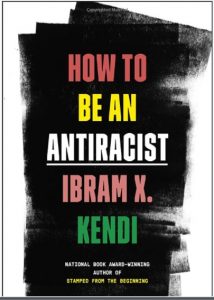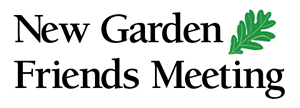 7:00 p.m. / via Zoom / We continue conversation centered around Ibram X Kendi’s book, “How To Be An Antiracist” Thursday, July 15 at 7 p.m. If you would like to join this Zoom group, please contact Sarah Gates who will be leading us and sending the Zoom invitations to participants. The queries associated with the three chapters we will be discussing (9,10 & 11) are listed below.
7:00 p.m. / via Zoom / We continue conversation centered around Ibram X Kendi’s book, “How To Be An Antiracist” Thursday, July 15 at 7 p.m. If you would like to join this Zoom group, please contact Sarah Gates who will be leading us and sending the Zoom invitations to participants. The queries associated with the three chapters we will be discussing (9,10 & 11) are listed below.
NGFM Book Discussion: Thursday, July 15th 7:00pm-8:00pm+
BOOK: How To Be An Antiracist (2019) by Ibram X. Kendi
QUERIES: For Discussion on Chapters 9 “Color,” 10 “White, and 11 “Black”
CHAPTER 9 COLOR
COLORISM: A power collection of racist policies that lead to inequities between Light people and Dark people, supported by racist ideas about Light and Dark people.
COLOR ANTI-RACISM: A power collection of antiracist policies that lead to equity between Light and Dark people, supported by antiracist ideas about Light and Dark People.
“To be an antiracist is to focus on color likes as much as racial lines, knowing that color lines are especially harmful for Dark people.” – Kendi
- Growing up, when was the first time you remember skin color or hair texture being addressed in your home, classroom, or community? What was said? What lessons did you internalize?
- Many people believe that the lighter the skin color the better, the straighter the hair the better. What do you believe? What do you consider to be the human beauty standard?
- Have you ever transformed or thought about transforming your appearance to make yourself look like you’re a different race or ethnicity?
- In your institution or community, are darker people of color or race more likely to be in less desirable roles than lighter people of color and White people? Think about the color character of your environment.
“To be an antiracist is to focus on color lines as much as much as racial lines, knowing that color lines are especially harmful to Dark people.” – Kendi
- Why is facing facts and accepting new knowledge essential to being antiracist?
- Why is refusing to face facts and rejecting new knowledge essential to being racist?
“Malcolm X once said, ‘I have always been a man who tried to face facts, and to accept the reality of life as new experience and new knowledge unfolds it.” – Kendi
- What policies could be changed to create more equity in your institution or community between lighter people, darker people, and White people?
CHAPTER 10 WHITE
ANTI-WHITE RACIST: One who is classifying people of European descent as biologically, culturally, or behaviorally inferior or conflating the entire race of White people with racist power.
- Not all White people benefit equally from racist policies affecting people of color. What groups of White people benefit the most? What groups of White people benefit the least?
“Racist power thrives on anti-White racist ideas – more hatred only makes their power greater.” – Kendi
- How does our focus on White people as the problem instead of racist power and policy lead to the strengthening of racist power and policy?
“I learned…that every time I say something is wrong with Black people, I am simultaneously separating myself from them, essentially saying ‘them niggers.’ When I do this, I am being racist.” – Kendi
CHAPTER 11 BLACK
POWERLESS DEFENSE: The illusory, concealing, disempowering, and racist idea that Black people can’t be racist because Black people don’t have power.
“The powerless defense does not consider people at all levels of power, from policy makers like politicians and executives who have the power to institute and eliminate racist and antiracist policies, to policy managers like officers and middle managers empowered to execute or withhold racist and antiracist policies. Every single person actually has the power to protest racist and antiracist policies, to advance them, or in some small way, to stall them.” – Kendi
- Many people refuse to believe that one can be racist towards their own racial group. Why do you think there is so much resistance to this idea?
- Consider how you understand your own power. Did your understanding of power make you feel powerless or powerful?
- Have you ever felt powerless? Share your story?
“Racist ideas make us feel powerless, and when we feel powerless, we don’t resist.” – Kendi
- How do you think slaveholders tried to make enslaved African feel powerless?
- How do you think Jim Crow segregationists tried to make Black people feel powerless?
- How do you think xenophobes today are trying to make Latinx immigrants feel powerless?
- How do you think racist Americans are trying to make antiracist American feel powerless?
- Do you have policy making power, policy managing power, and/or the power to resist policy? Consider what kind of power you have?
- Name a racist idea you heard this month in your workplace, on the news, or in casual conversation that you wish you had responded to. Reflect on how you could have deployed your power differently in that moment.
- How would you summarize your racial life?
“When we stop denying the duality of racist and antiracist, we can take an accurate accounting of the racial ideas and policies we support. For the better part of my life I held both racist and antiracist ideas, supported both racist and antiracist policies; I’ve been antiracist in one moment, racist in many moments.” – Kendi
- Was the previous question hard to write about? How did responding to it make you feel?
- Who is more of the problem – the person who refuses to acknowledge their racism or the person who admits their racism? Why?
List (three) facts about your views on race that you must face about yourself.
List (three) forms of new knowledge you’ve gained about yourself through discussing these queries that you must accept.
List (three) new ways you can begin using your power in the racial struggle.

